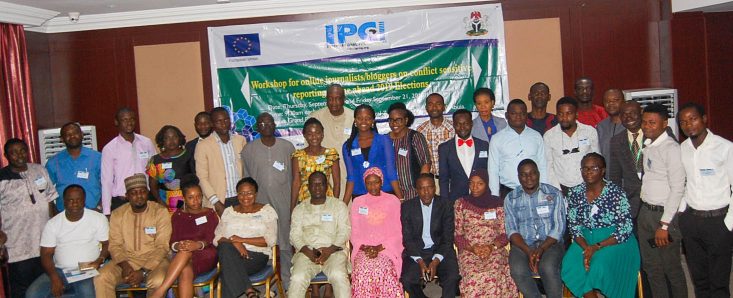
Special Report On The Role Of Online Media In Curbing The Rise Of Hate Speech
By Uchechukwu Ugboaja
The International Press Centre, IPC has made a clear and bold statement against the rise of hate speech by equipping journalists towards resisting the spread of fake news, which is also part of the Centre’s broader effort to encourage conflict sensitive reporting in the online media.
The IPC being Nigeria’s foremost media capacity building organisation has set out to develop certain skills and techniques amongst online journalists across the country to help them identify and deal with news reports, stories, images, messages or advertorials that contain disparaging, demeaning or hateful languages against a particular group or category of persons which is capable of triggering violent reactions or conflict.
In an attempt to deepen the role of the new/online media which has been identified as the latest convergence of unarguably all forms of media, in promoting credible electoral processes, inclusiveness, accountable democratic practices and overall service delivery, the IPC began by helping the journalist understand what conflict really is, it’s nature and characteristics. Conflict is discovered to rise as a result of human needs, interests and concerns as different interests trigger different conflicts across the world. Although it is believed to begin most times from Intra-personal dispute to the Inter-personal before escalating to the intra-group and intergroup conflict. However, it is accepted that journalists as purveyors of information to the public have a critical role to play in managing conflicts.
Communication makes or mars conflicts to the extent that the media as being responsible for what is consumed by members of the public in terms of information, is saddled with the responsibility to ensure that sensitive or crisis ladened stories are not reported in a manner which could result to break down of law and order in the society.
There were salient points noted while considering practical effects for conflict sensitive reporting such as; understanding that the fear of fake news ensures that online journalists become more cautious. It was also noted that even though the media alone cannot bring an end to hate speech in Nigeria but must explore other dynamic ways to increase a higher level of tolerance amongst members of the society. Furthermore, the online media can be a veritable tool to influence growth and development in the society and this can be best expressed when journalists desist from colouring reports with racial, tribal or ethnic language.
There are many occasions during conflict situations that a journalist could focus on stories that reflect basic values of humanity with a view to contributing to the reduction of tension, provocation and hostilities. A typical example is the case of the Islamic Cleric (Imam) who was reported to have sheltered Christians, during a recent sectarian crisis in Northern Nigeria. Over 100 Christians were saved by that action, an act that immediately earned the cleric a United Nations recognition.
Journalist must not get carried away by individual affiliations when reporting conflict sensitive issues. Rather than fueling crisis through their reports journalists can endeavour to promote consensus building in society.
What possible impact can one make with that story? Is it aimed at destabilising society or making it better? Is the story fair, balanced or factual? Online journalists must not forget that inaccurate stories have the tendency to stoke crisis and should.
There are a few strategies journalists need to posses for conflict sensitive reporting which include; profiling peace makers more than trouble makers in society, broadening the search for solutions, avoiding divisive labels, being proactive, being careful with translations. It is also important to interview the people directly affected by conflict as well as being mindful of the language use and the framing of our reports.
In reporting military activities, being conflict sensitive may not mean suppressing the news of what occurred but reporting it in a language that would not appear to be demeaning or ridiculing their efforts. Their stories must be framed in the most professional and responsible manner.
As a global phenomenon which is not peculiar to Nigeria, hate speech is stereotypical of culture, ethics, groups, gender and religion. When is occurs (knowingly or otherwise) it makes the journalist loose credibility, therefore it is always advised that the ethics of mainstream journalism must be applied into online reporting/journalism.
Uchechukwu Ugboaja is a journalist, social commentator, political analyst and Editor of TMNews.ng Email: uchesame83@gmail.com, Twitter: @samupresh, Facebook: Uche Ugboaja






